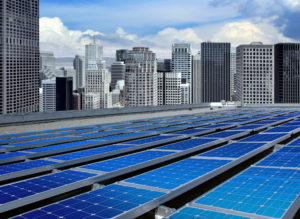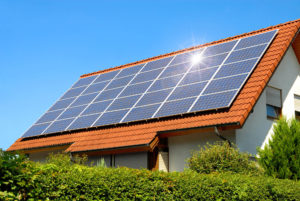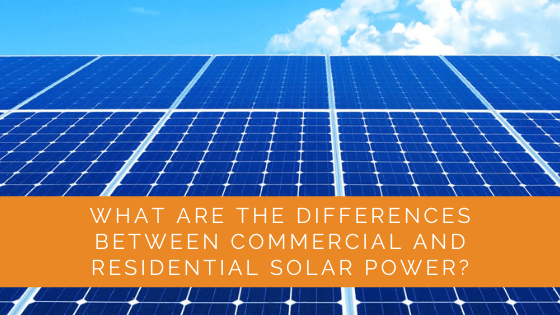Solar energy is a form of renewable energy produced by the sun, and we receive it in the form of sun rays. The sun produces a large amount of energy, and if we harness it in the right way, we can power large scale establishments just by using solar power.
We are all aware of how solar panels are used to convert solar energy into electrical energy. However, what most people fail to understand is how solar panels are of different types too. These panels largely vary from residential to commercial sectors.
This is because commercial sector energy requirement is significantly more than a residential complex or an average house. Several differences between the two will help you better grasp how solar power is harnessed in different establishments.
Continue reading to find out more about the differences between commercial and residential solar power.
Contents
- 1 Key Takeaways
- 2 What Are The Differences Between Commercial And Residential Solar Power?
- 3 Why Is It Beneficial To Use Solar Panels In Commercial Buildings?
- 4 Case Study: Implementing Solar Power Solutions for a Mixed-Use Complex
- 5 Expert Insights From Our Solar Panel Installers About the Differences Between Commercial and Residential Solar Power
- 6 Experience Solar Excellence with Us!
- 7 To Conclude With
Key Takeaways
- Commercial solar panels are installed flat on the roof without penetration, taking longer, while residential panels are angled and quicker to install.
- Commercial solar panels are larger with an average size of 78×29 inches and 96 cells, whereas residential panels are smaller at 65×39 inches with 72 cells.
- Commercial panels come in white and black, while residential panels are commonly black, but color choices depend on customer preferences.
What Are The Differences Between Commercial And Residential Solar Power?
Solar power in commercial and residential complexes differs from one another because of the varying requirements of energy. It is very important to identify the set-up used for your complex to make sure it is the right one.
So, here are a few differences between the two to help you understand better.
Installation
As you may already know, solar panels are installed on the roof of any establishment. Both commercial and residential solar panels are installed in the same way. However, the installation technique used is different for both of them.
When it comes to commercial solar panels, they are laid down flat on the roof and installed without penetration into the mounting system. The process is simple, but it can take a long time to complete. Commercial set-ups can often take as long as months to complete.
On the other hand, residential solar panels are installed depending on the roof’s shingles, so they are generally placed at an angle. Their installation process might be a little more complex. However, installation only takes a couple of days until the solar power set-up is up and running!

Size
One of the biggest and most prominent differences between commercial and residential solar panels is their size. You will notice a clear difference in the sizing of the two, which makes it easier to tell them apart.
Commercial solar panels are generally larger than residential solar panels used in homes and residential complexes. The size of commercial solar panels averages around 78 inches by 29 inches. This panel will have 96 cells in total.
Contrarily, a residential solar power set-up consists of panels with an average size of 65 inches by 39 inches. The panel will contain 72 cells in total and is visibly smaller than the commercial solar panel.
Color
Another factor that differentiates the two kinds of panels is the shades of colors they are available in. While it may not seem like something very consequential, the panel’s color is a very important differentiating factor.
Commercial solar panels are available in white and black, while most residential solar panels are colored black. The color of the panel entirely depends on the customer. It is commonly seen that people buying panels for their homes want black panels and backings.
On the other hand, with commercial solar panels, most customers demand black panels and white backings. This is up to the customers, so it is not a fundamental difference in their build. However, if you consider the common trajectory of purchases, you will notice the difference too.
Efficiency and Production
The energy production of a solar panel refers to how much energy it can generate concerning the solar energy it receives. The energy production of both commercial and residential solar panels differs from each other.
A commercial solar power set-up is bound to produce more electrical energy as compared to its residential counterpart. This is because the commercial panel is larger in size and has more cells in total. These physical attributes of the commercial cell enable it to produce more energy.
Contrarily, residential cells are smaller in size, and not many of them are required to power an entire house. Commercial cells are usually installed in large numbers to generate enough electricity for a commercial power complex.
Additionally, it is estimated that commercial solar panels are more efficient in their work compared to residential units. A commercial solar panel has an efficiency of 19.6 per cent, while a residential solar panel has a lower efficiency of 18.1 per cent.
When it comes down to the cost of the two panels, both cost the same. So, there is no significant difference in the pricing of the two.
Solar panels that are installed for companies and commercial spaces have a wide range of choices. The most common way to install a solar panel is on the roof of a building or a complex. However, with advancements in technology, solar panels can be installed in many creative spaces.

Variety
For instance, solar power set-ups can be installed in a commercial parking lot too. There is a lot of space available in such complexes so that you can install solar panels anywhere you deem fit.
This is not possible with residential solar panels. There aren’t many places in which you can install them, so they are usually just installed on the roof.
Why Is It Beneficial To Use Solar Panels In Commercial Buildings?
Solar power is one of the cleanest forms of energy that people can harness and use in their daily lives. The benefits of using solar panels for electricity are manifold. However, they are considered to be a crucial part of personal homes and residences.
Solar panels have a wide application in the commercial sector to. Here are a few benefits of using solar panels in commercial complexes and establishments.
- You get a great return on investment if you install solar power set-ups in your office building.
- You save money on your energy bills and also end up saving a ton of electricity.
- Your business operating costs are significantly reduced.
- Property value may see a hike due to solar panels.
- Your brand and company get a greener image, and you do your bit for the environment.
- You do not have to keep worrying about its maintenance.
- Commercial solar panels are a reliable source of energy for your company.
- You also get to enjoy tax reductions and additional credits for installing solar panels.
Case Study: Implementing Solar Power Solutions for a Mixed-Use Complex
Background
At Solar Panels Network USA, we cater to both residential and commercial clients, offering customized solar solutions tailored to diverse energy needs. Recently, we undertook a project to install solar power systems in a mixed-use complex combining residential units and commercial spaces.
Project Overview
The project aimed to demonstrate the feasibility and benefits of integrating solar power in a mixed-use complex. We focused on showcasing the different approaches required for residential and commercial solar installations within the same establishment.
Implementation
The mixed-use complex consisted of several residential apartments and commercial office spaces. Our implementation strategy involved distinct yet integrated approaches for the residential and commercial sections.
- Residential Solar Installation:
- We conducted an energy audit for the residential units to understand their specific energy consumption patterns.
- Based on this data, we installed solar panels on the rooftops of individual residential buildings, ensuring they were angled optimally to capture maximum sunlight.
- The installation process was completed efficiently within a few days, minimizing disruption to the residents.
- Commercial Solar Installation:
- For the commercial spaces, we analyzed the higher energy requirements and available installation spaces.
- We installed larger solar panels on the flat rooftops of the commercial buildings and utilized the expansive parking lot for additional solar panel installations.
- The commercial installation was more complex and took several weeks to complete, ensuring all safety and operational standards were met.
Results
The integrated solar power systems for the mixed-use complex yielded remarkable results. Both residential and commercial units experienced a significant reduction in their energy bills. The commercial spaces benefitted from the higher efficiency and larger size of the panels, meeting their substantial energy needs.
Residential units enjoyed consistent energy savings and appreciated the quick installation process. Additionally, the project highlighted the versatility of solar installations, effectively utilizing available spaces to maximize solar energy capture.
The project also enhanced the complex’s property value and contributed to a greener, more sustainable image for the community.
Summary
Our project at the mixed-use complex effectively demonstrated the distinct approaches and benefits of integrating solar power for both residential and commercial purposes. By leveraging tailored solutions, we provided a sustainable and cost-effective energy supply, significantly reducing energy costs and promoting environmental sustainability. This case study underlines our commitment at Solar Panels Network USA to delivering innovative and customized solar solutions that meet diverse energy needs.
Expert Insights From Our Solar Panel Installers About the Differences Between Commercial and Residential Solar Power
Understanding the differences in installation techniques for commercial and residential solar panels is crucial. Commercial installations are more extensive and take longer due to the flat, non-penetrative setup, whereas residential panels are typically angled and can be set up much faster.
Senior Solar Installer
The size and efficiency of solar panels significantly differ between commercial and residential uses. Commercial panels are larger and more efficient, designed to meet the higher energy demands of businesses. On the other hand, residential panels are smaller but sufficient to power individual homes.
Lead Solar Technician
Variety in installation locations is another key difference. Commercial setups can leverage vast spaces like parking lots, maximizing solar energy capture, while residential installations are mostly limited to rooftops due to space constraints.
Chief Installation Engineer
Experience Solar Excellence with Us!
Trust in Solar Panels Network USA, where our seasoned experts deliver top-quality solar solutions for homes and businesses nationwide. With a legacy of countless successful installations and a commitment to sustainable energy, we’re your reliable partner in the solar journey. Ready for a brighter, eco-friendly future? Call us now at (855) 427-0058 and harness the power of the sun!
To Conclude With
Solar panels play an important role in raising awareness about the use of cleaner energy. They have been around for decades, but their use was considered to be very restrictive. However, over the years, technology has made it easier for people to implement the harnessing of solar energy in various aspects.
Now, commercial use of solar energy is picking up pace faster than ever. They are relevant in both residential and commercial settings. All you need to do is pick the right panel.
Get your solar panels professionally installed by experts. Also, reach out to your solar maintenance provider to help you choose the right panel and for solving any inconsistencies in your system.
About the Author
Solar Panels Network USA stands at the forefront of solar energy solutions, driven by a team of seasoned solar engineers and energy consultants. With over decades of experience in delivering high-quality solar installations and maintenance, we are committed to promoting sustainable energy through customer-centric, tailored solutions. Our articles reflect this commitment, crafted collaboratively by experts to provide accurate, up-to-date insights into solar technology, ensuring our readers are well-informed and empowered in their solar energy decisions.

